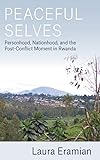Peaceful Selves : Personhood, Nationhood, and the Post-Conflict Moment in Rwanda / Laura Eramian.
Material type: TextPublisher: New York ; Oxford : Berghahn Books, [2017]Copyright date: ©2017Description: 1 online resource (202 p.)Content type:
TextPublisher: New York ; Oxford : Berghahn Books, [2017]Copyright date: ©2017Description: 1 online resource (202 p.)Content type: - 9781785337116
- 9781785337123
- Collective memory -- Rwanda
- Collective memory -- Rwanda
- Collective memory
- National characteristics, Rwandan
- Peace
- Reconciliation
- Self -- Social aspects -- Rwanda -- Butare
- Self -- Social aspects -- Rwanda -- Butare
- Self -- Social aspects
- Social conditions
- Bürgerkrieg
- Gewaltlosigkeit
- Individuum
- Konflikt
- Politisches Verhalten
- Sozialverhalten
- Stadt
- Völkermord
- Auswirkung
- Lebensstil
- Gewalttätigkeit
- Wirkung
- SOCIAL SCIENCE / Anthropology / Cultural & Social
- 1990s world history
- biographical
- ethnographic
- ethnography
- mourn
- murdered
- nationhood
- personhood
- post conflict society
- prosper
- psychology
- recovery
- rhetoric
- rwanda genocide
- rwandans
- selfhood
- small town
- social life
- sociology
- victims of violence
- 967.571043 23
- online - DeGruyter
| Item type | Current library | Call number | URL | Status | Notes | Barcode | |
|---|---|---|---|---|---|---|---|
 eBook
eBook
|
Biblioteca "Angelicum" Pont. Univ. S.Tommaso d'Aquino Nuvola online | online - DeGruyter (Browse shelf(Opens below)) | Online access | Not for loan (Accesso limitato) | Accesso per gli utenti autorizzati / Access for authorized users | (dgr)9781785337123 |
Frontmatter -- Contents -- Illustrations -- Acknowledgments -- Abbreviations -- Introduction: Person, Nation, and Violence in Rwanda -- 1. The Post-Conflict Moment in Butare and Its Antecedents -- 2. Ethnicity’s Specter in Post-Ethnic Times -- 3. Living with Absence -- 4. Creativity, Positive Thinking, and Their Perils -- 5. Making Peace by Remaking Persons -- Conclusion: The Post-Conflict, the Postcolonial, and Peaceful Selves -- Glossary of Kinyarwanda terms -- Bibliography -- Index
restricted access online access with authorization star
http://purl.org/coar/access_right/c_16ec
This ethnography of personhood in post-genocide Rwanda investigates how residents of a small town grapple with what kinds of persons they ought to become in the wake of violence. Based on fieldwork carried out over the course of a decade, it uncovers how conflicting moral demands emerge from the 1994 genocide, from cultural contradictions around “good” personhood, and from both state and popular visions for the future. What emerges is a profound dissonance in town residents’ selfhood. While they strive to be agents of change who can catalyze a new era of modern Rwandan nationhood, they are also devastated by the genocide and struggle to recover a sense of selfhood and belonging in the absence of kin, friends, and neighbors. In drawing out the contradictions at the heart of self-making and social life in contemporary Rwanda, this book asserts a novel argument about the ordinary lives caught in global post-conflict imperatives to remember and to forget, to mourn and to prosper.
Mode of access: Internet via World Wide Web.
In English.
Description based on online resource; title from PDF title page (publisher's Web site, viewed 25. Jun 2024)


